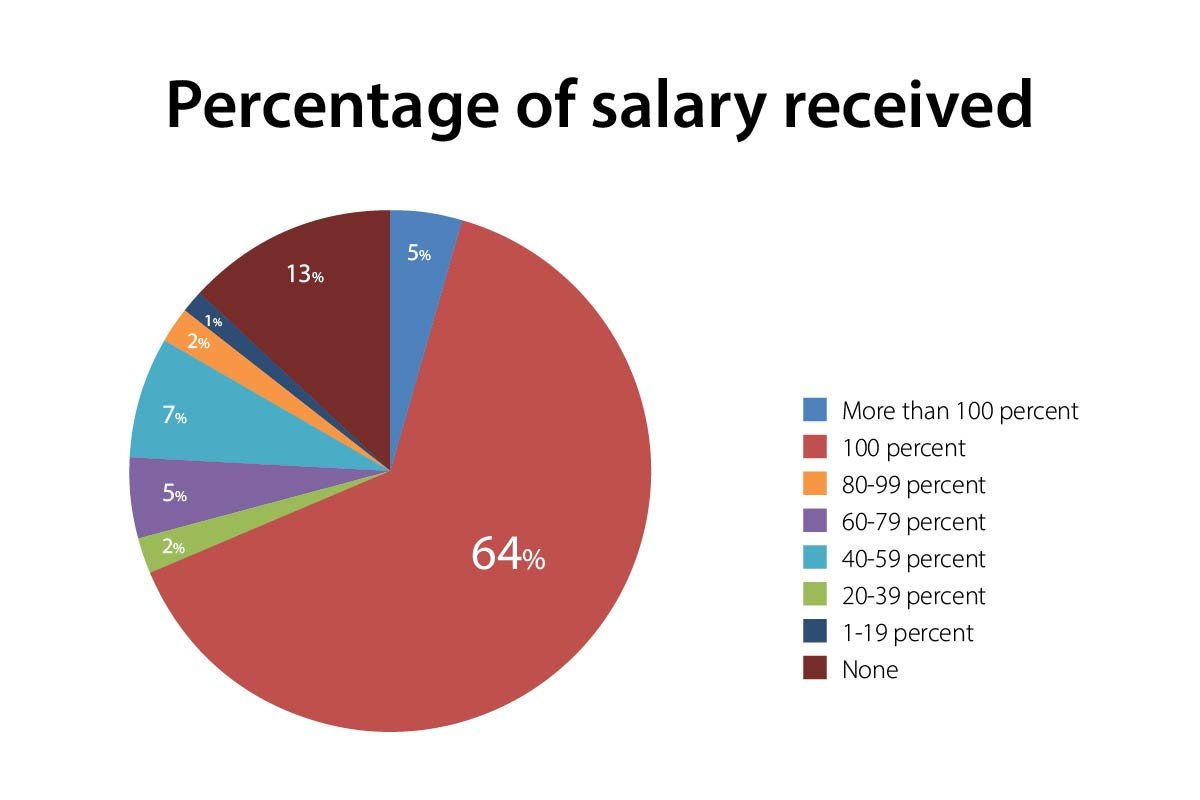Majority of Beijing Workers Received Full Salary for February
Results from an anonymous online survey conducted by the Beijinger reveal that despite massive disruptions in the capital, 69 percent of working respondents received the equivalent of or more than their normal salary for the month of February. Meanwhile, five percent of those received more than 100 percent of their regular salary, presumably due to paid overtime.
On the flip side, 13 percent of respondents said that they had received no salary at all for the month. Of the 18 percent of people who received a reduced salary, the average pay was 55 percent of their normal paycheck.
Over 300 people participated in the survey, which was circulated in six different expat-heavy WeChat groups.
The one-step survey did not collect data on which industries the respondents worked in, nor if they were employed on a full- or part-time basis. However, speaking to a number of respondents, we were able to get an understanding of how the work of several individuals has been affected by the coronavirus.
One teacher, who requested anonymity, received 100 percent of their regular international school salary, plus a one-time bonus package, including RMB 10,000 for travel expenses, RMB 5,000 for spousal support, and RMB 2,500 per dependent child. It is unclear whether this was on top of what was stipulated in their contract or adjusted on account of the current situation.

Another respondent, Anne, who works in intellectual property trademarking overseas businesses in China also received extra pay for February. "The government suggested Feb 10 as a back-to-work date, so our boss decided to add a RMB 100 bonus for every working day from Feb 3 to Feb 10." Anne profited from this incentive, working a full extra week. Yet her colleagues who are have been unable to return to Beijing have received no salary at all, and one employee was let go by the company. "The government gives subsidies to small and medium-sized enterprises but only if they lay off workers no more than 20 percent of their employees," Anne says.
On the other hand, another international school teacher stated that they received only 80 percent of their usual salary and that the transition to online teaching has been time-consuming. "I was disappointed by the lack of transparency from the school regarding the reduced income. I'm also uncertain about the future, if could they reduce [our salaries] further next month."
When it comes to flexible working hours, some have been hit harder than others. An English teacher we spoke to estimates their salary has been reduced to about 16 percent of normal, due to a non-negotiable change of contract that reduced their working hours to just three classes per week, at RMB 200 per class. "Whether we sign [the contract amendment] or not, the school will still go ahead and pay us those rates. Some colleagues were going to fight that change but quickly realized that they could lose their jobs. Although I too was unhappy about the rates, I was not prepared to fight the school as I don't want to lose my job."
A pre-kindergarten teacher at an international school was forced to take unpaid leave for February and is not eligible to do remote work (like many of their colleagues) unless they are physically in Beijing. They are concerned both about the lack of income, and being forced to return to an uncertain situation with three children. "It’s really bad. I’m really worried about the whole situation. My spouse is still in Beijing and working – that’s good – but I wouldn’t plan to go back if I didn’t have to for my job."
READ: Teachers Grapple With Hidden Workload as E-Learning Persists
Related stories :
Comments
New comments are displayed first.Comments
![]() Leendert
Submitted by Guest on Sun, 03/29/2020 - 03:47 Permalink
Leendert
Submitted by Guest on Sun, 03/29/2020 - 03:47 Permalink
Re: Majority of Beijing Workers Received Full Salary for...
Surprised to hear that people were paid mostly normally. My company paid 50% in February (which I thought was understandable), and although 1-5 February was personal paid holiday, this was scrapped. In March, will be receiving 70% of minumum wage (basically a third of my rent costs in Chaoyang), whilst doing online 5 classes of an hour per week. They also refuse to pay you if you are outside Beijing, and you can only receive it if you return (which is impossible currently) or resign. This is a big international bi-lingual kindergarten school with many campuses, and would definitely have had the funds, but opted not to look after their employees. I wish there was a public list detailing the actions and character of the companies during the corona times, to honor those who acted humanely and expose those who act inhumanely.
Validate your mobile phone number to post comments.







